More Than Just a Delicacy! Yunnan’s Wild Mushrooms Hold Big Secrets
来源:InKunming时间:2025-08-27 09:41:23
In Yunnan’s rainy season, even the air is permeated with the fresh aroma of mushrooms.
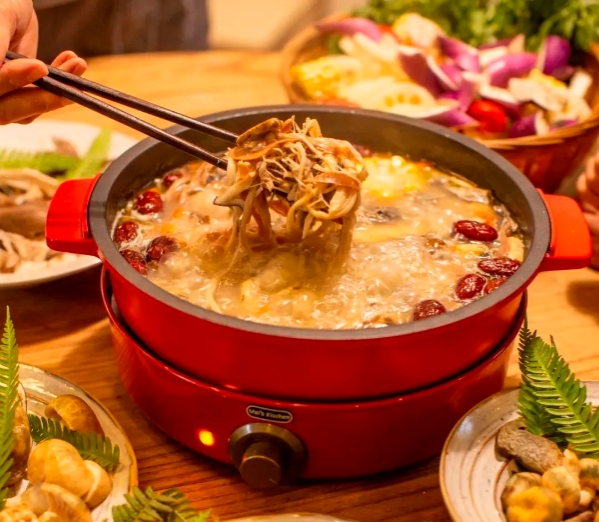
“As soon as the rainy season arrives, all kinds of mushrooms come out, and the air is filled with their scent.” More than 40 years after leaving Kunming, writer Wang Zengqi still couldn’t forget this fresh flavor. Wild mushrooms, affectionately called “junzi” by Yunnan people, are not only a delicacy of the plateau but also a cultural symbol deeply ingrained in the local gene.
Recognizing Mushrooms and Savoring Flavors: The Wisdom of the Mountains
Yunnan people have long-standing rules for eating mushrooms. The local adage says, “The more beautiful the mushroom, the more toxic it is; don’t eat mushrooms you don’t recognize,” reflects the most genuine reverence for nature. Porcino jizong(termite mushroom), matsutake, “jianshouqing” (suillellus luridus, a type of toxic but edible mushroom when cooked properly)... Behind each name lies a local story.
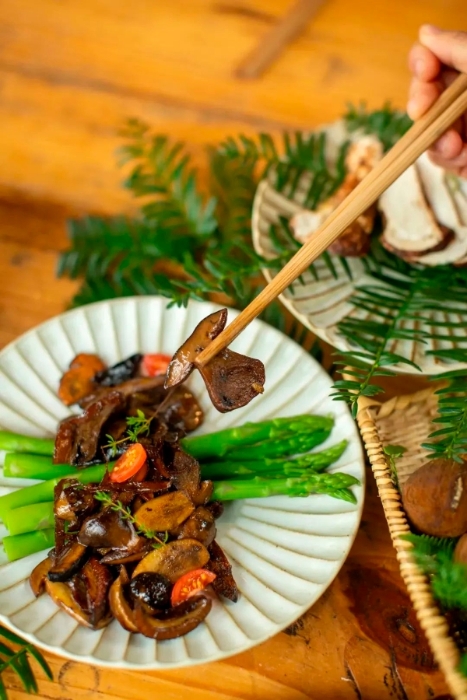
To protect the generosity of the mountains, many places in Yunnan have implemented the “mountain contracting for mushroom picking” model. In Chuxiong Yi Autonomous Prefecture, the right to pick wild mushrooms in collective mountains is contracted to villagers, with unified management and scientific picking, which not only protects the ecology but also promotes income growth. Wild mushroom farm stays have become a bright spot in rural revitalization.
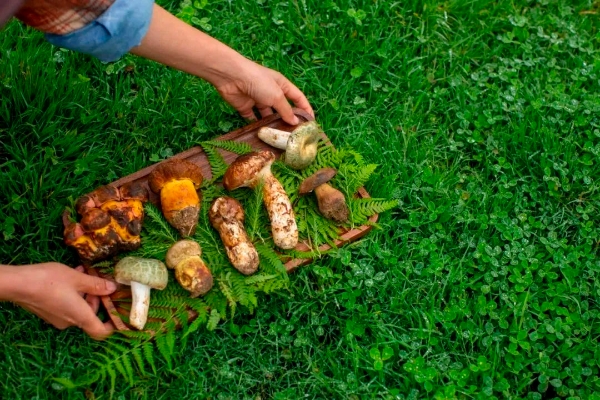
Hidden in the Mountains, Thriving in Farmhouses
In Shuicheng Village, Chadian Town, Wuding County, every rainy season, mushrooms quietly pop up – some hide under pine needles, some nestle in depressions, as if engaging in a natural game of hide-and-seek with mushroom pickers.
Many tourists, after picking mushrooms, take them directly to the village’s farm stays for processing. “During the busiest time, we receive two to three hundred people a month,” said Zhu Guangneng, the owner of “Zhu Family Courtyard.” After sorting, cleaning, and cooking... the fresh flavor of the mountains turns into delicious dishes on the table. In just one mushroom season, the 11 farm stays in Shuicheng Village can generate approximately 800,000 yuan in revenue.
A Sri Lankan Mycologist’s Love Affair with Yunnan
Samantha from Sri Lanka is now a foreign expert at Qujing Normal University. His life has long been intricately linked with wild mushrooms – studying the classification, phylogeny, and domestication of wild mushrooms is his dedicated career.
In high school, the colorful wild mushrooms fascinated him, and he was determined to make this his career. Later, he studied mycology in Thailand, where he met his Thai wife, Tibpromma, who also loves mycology. In 2012, a field trip to Xishuangbanna made him feel the unparalleled diversity of wild mushrooms in Yunnan for the first time. Since then, he has made up his mind: he must return to Yunnan.
In 2016, his wish came true. He and his wife entered the Kunming Institute of Botany, Chinese Academy of Sciences, for postdoctoral research. When he first came to Yunnan, he couldn’t speak Chinese, but with his love for mushrooms, he could chat happily with mushroom vendors in the market. He was not only curious about the Chinese names of each type of mushroom but also wanted to know how Yunnan people cook them – and this opened up a brand-new culinary universe for him.
“Foreign mushrooms are often cooked alone, but in Yunnan, people can put more than ten kinds of mushrooms into chicken soup to make hotpot!” Mushroom hotpot has now become an important way for Samantha to connect with his students.
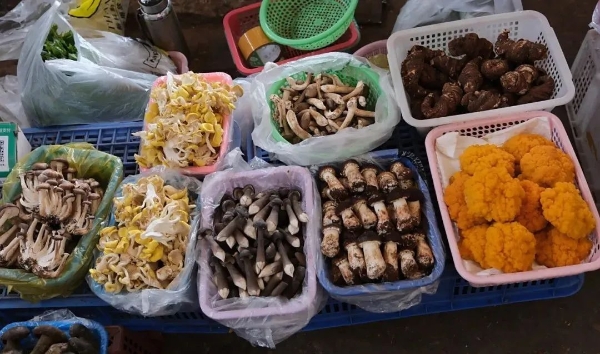
One Mushroom, One Flavor: Yunnan’s Philosophy of Fresh Cooking
Yunnan people value the original flavor of mushrooms highly. Stir-frying and braising are the most classic ways to prepare them.
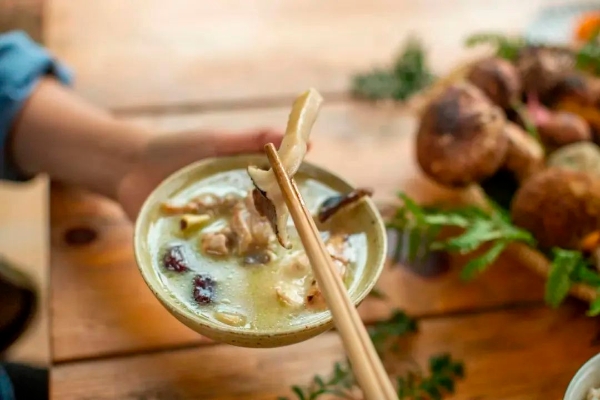
Jizong are stir-fried simply with green peppers, resulting in a milky white, sweet, and delicate soup. Porcino(Boletus) is sliced and stir-fried with garlic, green onions, and chili until fragrant – one bite, and the mushroom aroma mixed with the wok’s heat strikes the soul directly.
The humble dried bark mushroom(thelephora ganbajun), though time-consuming to clean, conquers the taste buds with its rich and unique aroma. When used to fry rice, every grain absorbs the essence of the mountains.
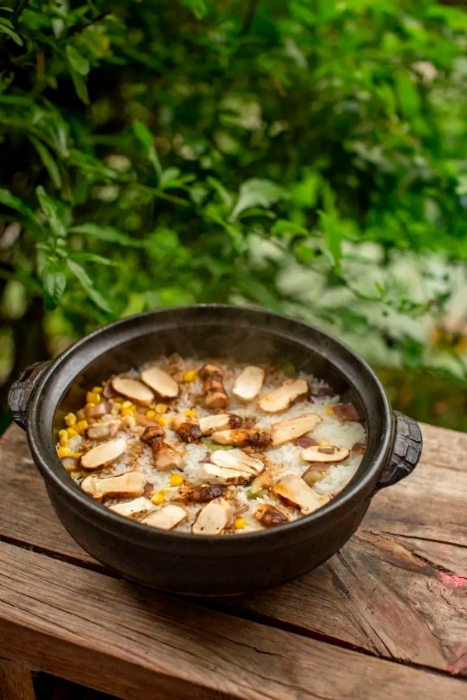
And mushroom hotpot can be called the “masterpiece of fresh flavor.” Simmer chicken to make the base, then add eight to ten kinds of mushrooms in sequence, and wait patiently for 20 minutes. Before the time is up, don’t touch the chopsticks – this is the ritual sense Yunnan people have for eating mushrooms. When the pot is opened, first drink the soup, then eat the mushrooms: the plump “jianshouqing,” the tender porcino(boletus), the crisp bamboo fungus(phallus indusiatus)... every bite feels like a gift from nature.
Visit a Mushroom Market, Experience Yunnan’s Liveliness
If you can’t go to the mountains yourself, you might as well go to a wild mushroom market to feel the atmosphere. Kunming’s “Mushuihua” Wild Mushroom Trading Center has become a popular check-in spot for young people.
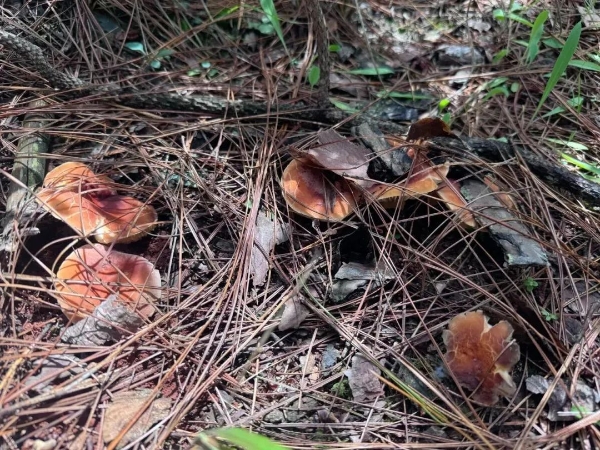
Every afternoon at three or four o’clock, as soon as the mushroom transport vans stop, they are surrounded by crowds. Experienced buyers act quickly – “I want this basket!” With that, a basket of mountain treasures finds its owner. This is not just a market but a living scene of Yunnan’s rainy season.
Technology Empowers, Realizing “Jianshouqing Freedom”
Behind the delicious taste, technology is injecting new impetus into the sustainable development of the wild mushroom industry.
In the Kunming Edible Fungi Research Institute of the All-China Federation of Supply and Marketing Cooperatives, artificially cultivated “jianshouqing” have grown plump caps. Assistant Researcher Liu Qimeng stated that after years of research, the team has finally successfully cultivated a new variety of “jianshouqing” that can be artificially grown. At present, four enterprises have carried out cooperative cultivation, and in the future, this “mountain treasure” will appear on more people’s tables.
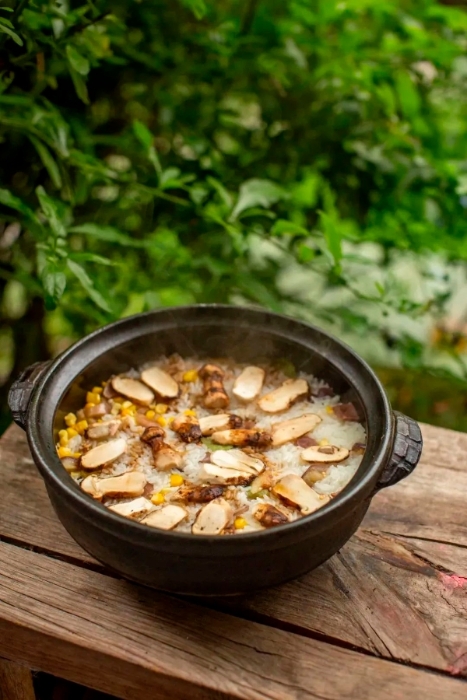
A Bite of Mushroom Aroma, a Lifetime of Yunnan Affection
Wild mushrooms are not just a seasonal delicacy on Yunnan people’s tables but also a taste bond connecting nature, humanity, and emotions.
Every time the mushroom season comes, sitting around a table with family and friends, watching the bubbling mushroom hotpot, chatting and laughing – that warmth and freshness will eventually settle into the warmest memory of the years.
Every bite of mushroom conveys gratitude for nature, a love for life, and a cherishing of simple happiness.
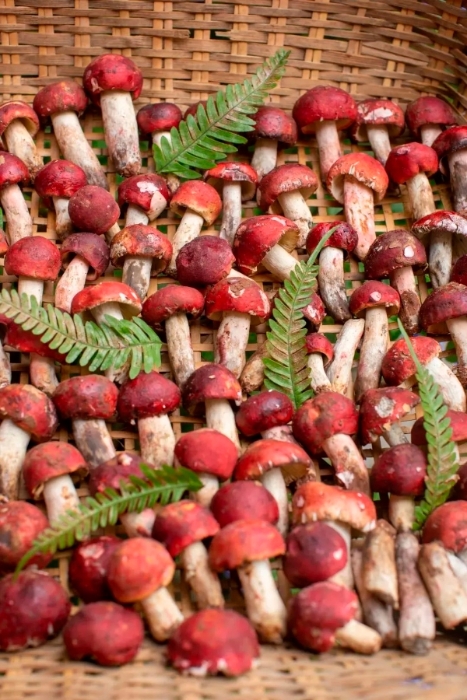
Have you come to Yunnan to eat mushrooms this rainy season?
雨季的云南,连空气都浸润着菌子的鲜香。
“雨季一到,诸菌皆出,空气里一片菌子气味。”作家汪曾祺离开昆明四十余年,仍对这口鲜味念念不忘。野生菌,云南人亲切地称它为“菌子”,不仅是高原的珍馐,更是一种深入肌理的文化符号。
识菌知味,山野的智慧
云南人吃菌,自有其传承已久的讲究。“越漂亮的菌子越有毒,不认识的菌子不吃”,这句民间老话,道出的是对自然最本真的敬畏。牛肝菌、鸡枞、松茸、“见手青”……每一种名字背后,都是一段风土故事。
为守护这片山林的慷慨,云南多地推行“包山采菌”模式。楚雄彝族自治州将集体山林野生菌采摘权承包给村民,统一管理、科学采摘,既保生态,也促增收。野生菌农家乐,成了乡村振兴中一抹亮丽的风景。
藏于山野,兴于农家
在武定县插甸镇水城村,每逢雨季,菌子便悄悄探出头——有的隐身松针之下,有的藏匿洼地之间,像是与采菌人玩着一场自然捉迷藏。
许多游客采菌后,会直接拿到村里的农家乐加工。 “朱家小院”的老板朱光能说:“最旺的时候,我们一个月要接待两三百人。”挑拣、清洗、烹饪……一道道工序之后,山野鲜味化作餐桌佳肴。仅一个产菌季,水城村11家农家乐就能创收约80万元。
一位斯里兰卡菌物学家的云南情缘
来自斯里兰卡的萨曼塔(Samantha),如今是曲靖师范学院的一名外国专家。他的生命早已和野生菌紧紧相连——研究野生菌分类、系统发育和驯化,是他专注的事业。
高中时,色彩斑斓的野生菌就让他着迷,并立志以此为业。后来他在泰国攻读菌物学,结识了同样热爱菌物的泰国妻子提布若玛(Tibpromma)。2012年,一次西双版纳的野外考察,让他第一次感受到云南无与伦比的野生菌多样性,从那时起,他就下定决心:一定要回到云南。
2016年,愿望成真。他与妻子一同进入中科院昆明植物研究所从事博士后研究。初来云南,他虽不会中文,却凭借对菌子的热爱,能和菜市场的菌贩聊得投机。他不仅好奇每一种菌子的中文名字,更想知道云南人如何烹饪它们——而这,为他打开了一个全新的美食宇宙。
“国外的菌子往往是单独烹饪,但在云南,人们可以把十几种菌子一起放进鸡汤里做火锅!”菌子火锅如今也成了萨曼塔与学生交流情感的重要方式。
一菌一味,滇式烹鲜哲学
云南人吃菌,极重本味。炒与烩,是最经典的演绎。
鸡枞清炒,辅以青椒,汤汁乳白、清甜细腻;牛肝菌切片,伴蒜葱辣椒爆香,一口下去,菌香裹挟锅气直击灵魂。
其貌不扬的干巴菌,清理虽费工夫,却以浓郁异香征服味蕾。用它来炒饭,每一粒米都吸饱山野精华。
而菌子火锅,则堪称“鲜味的集大成者”。土鸡熬汤作底,八至十种菌子依次下锅,耐心守候二十分钟。时间未到,筷子不发——这是云南人吃菌的仪式感。开锅那一刻,先喝汤、再吃菌,见手青肥厚、牛肝菌滑嫩、竹荪脆爽……每一口都是自然之吻。
逛菌市,体验云南式热闹
若无法亲自上山,不妨去野生菌交易市场感受气氛。昆明“木水花”野生菌交易中心,已成为年轻人热衷的打卡地。
每天下午三四点,运菌面包车刚一停稳,便被围得水泄不通。经验丰富的买手眼疾手快——“这筐我要了!”一声落下,一筐山珍便有了归属。这里不只是一个市场,更是一场云南雨季的生活现场。
科技赋能,实现“见手青自由”
在鲜美滋味的背后,科技正为野生菌产业的可持续发展注入新动力。
中华全国供销合作总社昆明食用菌研究所里,人工培育的“见手青”已长出肥硕的菌盖。助理研究员刘祈猛介绍,团队历经多年攻关,终于成功培育出可人工种植的“见手青”新品种。目前,已有四家企业开展合作栽培,未来这份“山珍”将走上更多人的餐桌。
一筷菌香,一世云南情
野生菌,不只是云南人餐桌上的季节限定,更是串联起自然、人文与情感的味觉纽带。
每当菌季来临,与家人朋友围坐一桌,守着咕嘟冒泡的菌子锅,说说笑笑——那种暖意与鲜美,终会沉淀为岁月中最温暖的回味。
每一口菌子,都是对自然的感恩、对生活的热爱,也是对简单幸福的珍惜。
这个雨季,你来云南吃菌了吗?



